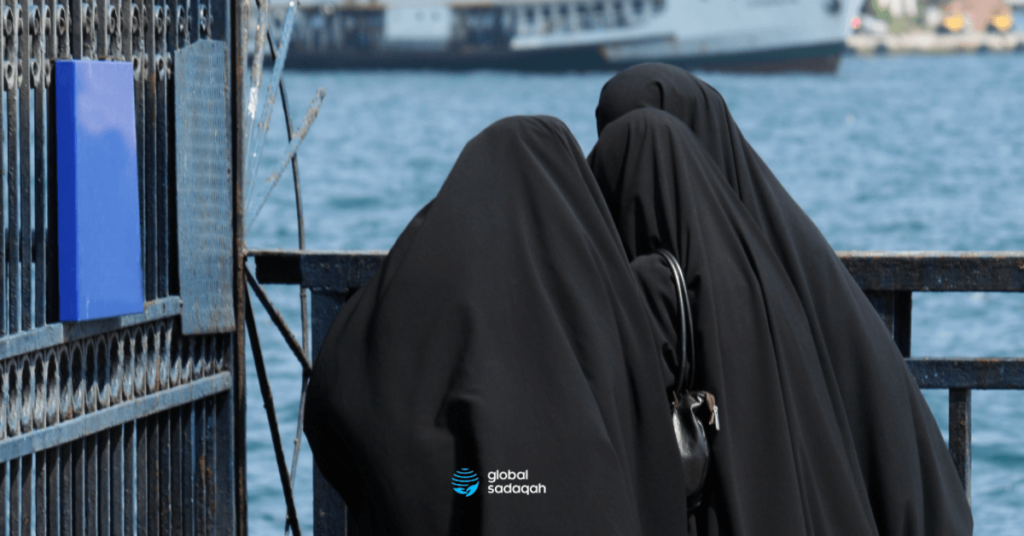Have you already paid for your zakat? If you did, you might be curious about who will benefit from your contributions.
Allah tells us in the Quran:
نَّمَا الصَّدَقَاتُ لِلْفُقَرَاءِ وَالْمَسَاكِينِ وَالْعَامِلِينَ عَلَيْهَا وَالْمُؤَلَّفَةِ قُلُوبُهُمْ وَفِي الرِّقَابِ وَالْغَارِمِينَ وَفِي سَبِيلِ اللَّهِ وَابْنِ السَّبِيلِ ۖ فَرِيضَةً مِّنَ اللَّهِ ۗ وَاللَّهُ عَلِيمٌ حَكِيمٌ
“Indeed, [prescribed] charitable offerings are only [to be given] to the poor and the indigent, and to those who work on [administering] it, and to those whose hearts are to be reconciled, and to [free] those in bondage, and to the debt-ridden, and for the cause of Allah, and to the wayfarer. [This is] an obligation from Allah. And Allah is All-Knowing, All-Wise.” [Surah Al-Tawbah, 60]
- The poor
- The needy
- Collectors of zakat
- Softening the hearts
- Slaves
- Those in debt
- In the path of Allah
- The stranded traveller
Additionally, narrated Ziyad ibn al-Harith as-Suda’i: I came to the Messenger of Allah (ﷺ) and swore allegiance to him, and after telling a long story he said: “Then a man came to him and said: Give me some of the sadaqah (alms).”
The Messenger of Allah (ﷺ) said: Allah is not pleased with a Prophet’s or anyone else’s decision about sadaqat till He has given a decision about them Himself. He has divided those entitled to them into eight categories, so if you come within those categories, I shall give you what you desire. [Abu Dawud]
Essentially, zakat is forbidden upon the tribe of Banu Hashim, the rich, the strong, and people who can strive to earn a living.
It is permissible to give the entire amount of zakat to either only one category or even one person from that category. Imam Ahmad related that the Prophet ordered Banu Zurayq to give the zakat due upon them to Salamah Ibn Sakhr.
Furthermore, it is recommended to distribute the zakat to the people of the area where the zakat is taken from. We see in the Hadith of Muadh that the Prophet ﷺ said, “Take it from their rich and give it to their poor.”
It is permissible to transfer the zakat to other areas as well to meet dire needs or to satisfy any other legal interest. This could also be because those outside in need are in more dire need than the ones in the immediate vicinity.
Sheikhul Islam Ibn Taymiyyah said, “It is obligaotry to give zakat to all eight categories of people; otherwise, it is to be given to the available categories and transferred to where they live. Zakat must not be given to whoever does not use it to obey Allah, for Allah ordains zakat for the believers entitled to it, such as the poor and the debtors, to help them obey Him, and for those Muslims who help the believers. Of those entitled to zakat, whoever does not perform prayer must not be given anything until he repents and performs prayer at its due time.” [al-Ikhtiyaraat]

according to Sheikh Ibrahim Nuhu.
Other than zakat, there’s also a question of who is eligible for charity in Islam. Who is permissible to accept from charity funds? In his commentary of the hadith of Qabisah bin Mukhariq Al-Hilali, Sheikh Ibrahim Nuhu said, “Three people who can take from charity:
- guarantor can take from charity to pay back the guarantee taken in his name. He is allowed to take from zakat or charity money until he gets his amount after which he must stop. After this it becomes impermissible for such a person to accept charity.
- He who has lost everything because of a calamity (natural or otherwise as long as precautions were taken), can accept charity until their needs are sufficed and then they have to stop.
- Someone tested with extreme poverty. They can accept charity until their needs are sufficed and then they have to stop.
Are the fuqara and the masakin able to accept charity?
The fuqara are those who do not possess enough provisions to meet their needs—they can be categorised as poor. The masakin are those who have less need for assistance than the faqir but still have needs.
Abu Hurairah reported: Messenger of Allah (ﷺ) said, “A miskin (needy) is not the one who can be turned away with a date-fruit or two, or a morsel or two. The true miskin is one who, despite his poverty, abstains from begging”. [Bukhari and Muslim].
Since these are the most famous categories of asnaf that we see around us, it is good to learn more about them.
Islamic scholar Sheikh Abdus-Salaam ash-Shuway’ir explained the difference between a fakir and miskin, emphasising that it revolves around those who are either completely devoid of or deficient in one of the following five matters:
- Food and drink
2. Clothing: Some scholars say that the minimum needed for a person is an outfit for summer and winter. Others say that it goes back to their custom and what they deem as the minimum.
3. A place to live in: A family should be given enough rent money that suffices for a year. Additionally, the living quarters must be appropriate for their family’s size.
4. A male who does not have enough money to become married and is fearful of falling into sin: In this case, the Zakah donated should suffice for a normal sensible priced dowry.
5. Everyday essentials necessary to live: The definition or understanding of everyday essentials differs according to the custom of the different lands and cultures. According to the Sheikh, these essentials could also include air conditioners in extremely hot places like in Makkah. If someone doesn’t have AC or lives with a broken AC, then it is permissible to give zakat money to fulfill that need.
If someone is completely devoid of one of the five mentioned categories or is unable to fulfill either one, then they are considered to be a fakir. If someone is deficient but not completely devoid of one of the five mentioned categories, then they are considered a miskin. Therefore, the fakir is considered to be in more need than the miskin.
Point four as listed by Sheikh ash-Shuwayir above might be surprising for some readers. The Ex-Grand Mufti of Saudi Arabia, Sheikh Ibn Baaz was asked about giving zakat to a young man who cannot afford to get married. He said: “It is permissible to give zakat to this young man, to help him get married, if he cannot afford it.”

Collectors of zakat or amil zakat
This is a person who is employed to collect, manage, record, and distribute zakat amongst the entitled beneficiaries.
For a person to perform the duties of Amil Zakat they must be:
| 1. Muslim 2. Mentally of a sound mind 3. Attained the age of puberty 4. Trustworthy 5. Honest 6. Must have general and complete knowledge of zakah rulings and regulations 7. Efficiency and Productivity |
Narrated by Ibn al-Sa’idi: Umar appointed me to collect the sadaqah (i.e. zakat). When I finished collecting it, and delivered it to him, he ordered me to take a payment for it. I said: I have worked for the sake of Allah. He said: Take what you have been given, for I held an administrative post in the time of the Messenger of Allah (ﷺ), and he gave me payment for it. [Abu Dawud]
An Amil zakat can be given a share from the zakat only if they are not already getting a salary from the government for doing this job.
It is reported on the authority of Anas, that a man said to the Messenger of Allah ﷺ, “When I give zakat to your messenger, will I become free of liability with Allah and His Messenger?” The Messenger of Allah replied in the affirmative and said, “When you give it to my messenger, you have become free from liability thereof in the sight of Allah and His Messenger (ﷺ). You will have the reward for it and the sin (thereof) will be on the one that changes its course” [Ahmad]
However, an Amil zakat cannot originate from the tribe of Banu Hashim. Abdul Muttalib bin Rabi’ah bin Al-Harith narrated that The Messenger of Allah (ﷺ) said: “Indeed, zakah ought not to be given to the family of Muhammad, it will be like giving them from the impurities of people.” In another narration, “It is not lawful for Muhammad or the family of Muhammad(ﷺ). [Muslim]
How much can an amil zakat charge?
A zakat Collector is paid either 12.5% or the most fair rate according to their level of work.
- They must also be paid even if they are rich.
- If the person is appointed by the authority then his wages can be taken from the zakah.
- If this authority doesn’t exist then the wages are taken from the rich and not from the zakah funds.
It can also happen that the amil zakat is a person who falls under the other categories as well. In such a situation, they are paid the wages for being an amil zakat and another portion is being paid for qualifying under another category. If they are poor, they should be given enough that suffices their needs for one year.
Sheikh Ibrahim Nuhu حفظه الله said, “An amil (zakah collector) is not allowed to take any gift from the customers or those related to the job. In Islam, a very strong principle states that; that what is not meant to be taken is also not meant to be given. Don’t give someone a gift if you like their work while they are still employed in that work. The gifts impact the sincerity of a person’s work. When they leave the work and move on, then you can approach them and give them your gift.”
Dr.Obaidullah summarizes the topic:
“Imam al-Shafi’i is reported to have suggested that total compensation for workers must not exceed one-eighth (12.5%) of the total proceeds of zakat, based on his opinion that total proceeds must be divided equally among the eight recipient categories. Sheikh Yusuf al-Qaradhawi argues that an amil should be paid a salary equal to the market value of his or her skill and labor.
Zakat bodies in Sudan calculate approximately 15% for staff salaries and approximately four percent for operational costs. If the total administrative cost is beyond 20 percent, then this is considered inefficient.
Some scholars completely reject the use of zakat funds for covering administrative costs. For example, in Nigeria as well as in South Africa, scholars recommend covering administrative costs with sadaqah instead of zakat.
In South-East Asian countries, as discussed before, a cap of one eighth (pro rata share of amileen as one of eight asnaf) is prescribed.”

